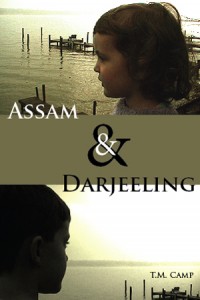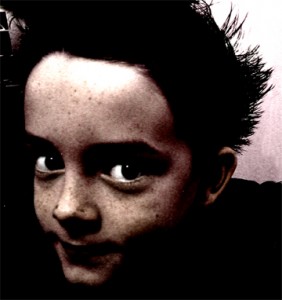In which I relate how I got my Big Break . . . and then let it go.
I’ve been dropping hints here and there for a while now, but here’s the full story…
 A few weeks back I received a professional inquiry from a company in Singapore, interested in my novel Assam & Darjeeling. They’ve got connections with companies here and overseas, everything from comics to anime to manga to you-name-it. Pretty exciting stuff, really. It’s exactly the kind of inquiry you want to get and it’s hard not to say “Oh man, this is really going to happen.”
A few weeks back I received a professional inquiry from a company in Singapore, interested in my novel Assam & Darjeeling. They’ve got connections with companies here and overseas, everything from comics to anime to manga to you-name-it. Pretty exciting stuff, really. It’s exactly the kind of inquiry you want to get and it’s hard not to say “Oh man, this is really going to happen.”
After a number of e-mails and phone calls back and forth, they asked for permission to “pitch” the story in their conversations — which was perfectly fine by me. I prepared a packet for them that included a synopsis, sample chapters, and about an hour’s worth of audio from the podcast. Along with this, I included a release that allowed them to discuss the story in their meetings but also clearly outlined where the boundaries of the relationship were. Thus armed, off they went.
Throughout all of this, everybody was enthusiastic and hopeful but the conversations were tempered with a healthy does of realistic expectations. All good stuff.
Reporting back, they let me know they’d had some conversations (I don’t know if I can say with whom, so I won’t) and those had gone well. There was a lot of interest in what they were now calling the “property” and also a handful of questions and ideas for me to consider.
I work in advertising so I’m used to being open to ideas from other people. And my work as a playwright has taught me that there’s often good energy generated when different ideas come together. And I know enough about the Industry to not be offended by the term “property” in relation to my work.
Not surprisingly, some of the questions reflected the typical concerns that crop up in any meeting with Marketing people: Who’s the audience? Is this a book for kids or adults? What’s the demographic?
I have these kinds of conversations all the time. And, admittedly, Assam & Darjeeling isn’t perhaps a story that lends itself to age-based marketing. And there was a tone in the comments I was hearing that suggested it wasn’t a matter of trying to define what the audience was, but to redefine the story for a specific audience. As I wrote in my response “Oftentimes, this tendency results in a redefinition of the story to meet what marketing perceives to be the expectations and/or tastes of that audience. The results of that effort are not always successful.”
Diplomatic but valid.
Polite disagreement crept in on a few other points as well. There was a comment that the title was perhaps too “obscure” and also a concern that it sounded “too feminine” — this last one was pretty baffling to me.
Alternate titles were suggested that were more interesting (to them) and more in line with the theme of “payment” at the center of the book (as perceived by them). Since that concept isn’t, in fact, the central theme of the story, I didn’t mind offering more polite disagreement.
 To help clarify where I saw the audience for the book, where I saw a market for the book, what I believed the central theme to be… well, I thought it would be helpful to point them towards a few things that resonate on a similar frequency. It takes some kind of gall for an unknown author to invoke masterpieces like Pan’s Labyrinth, Grave of the Fireflies, Night of the Hunter, and To Kill a Mockingbird, but I did it without apology. And they seemed to understand where I was coming from.
To help clarify where I saw the audience for the book, where I saw a market for the book, what I believed the central theme to be… well, I thought it would be helpful to point them towards a few things that resonate on a similar frequency. It takes some kind of gall for an unknown author to invoke masterpieces like Pan’s Labyrinth, Grave of the Fireflies, Night of the Hunter, and To Kill a Mockingbird, but I did it without apology. And they seemed to understand where I was coming from.
Overall the conversation was a good one and everyone involved seemed genuinely interested in finding common ground to make this a successful venture.
But there was a question that been nagging at me since the beginning of our conversations and I followed up with an e-mail to ask it: Where were they heading with all of this?
See, to me it’s a book first and foremost. But my conversations with them had run through a wide range of possibilities including anime, manga, comics, feature films, merchandising, etc. — none of which I’m opposed to, of course. But in my mind it all grows out of that book I wrote. I had the impression they had a different focus. So I sent off my e-mail and waited for a reply.
The next conversation was, by everyone’s standards, a hard one. They were still quite interested in the property but they had serious concerns that they wouldn’t be able to do much for me if they didn’t have the freedom to explore everyone’s ideas in their conversations. That is to say, if someone had an idea in a meeting — say, for instance, to change the names of the characters — they needed to be able to run with it. And I had to accept the fact that whatever this things turned out to be — movie, manga, Saturday morning cartoon series, or breakfast cereal — it was likely to be different than what I’d written.
But, of course, I could count on them to stay true to the spirit of the original idea . . . in some form or another. They had a lot of faith in the property as a franchise of some kind and I could be confident that I’d get my share of the royalties. But in order to be successful, to take this property as far as they could go, they needed complete creative control. They needed, in short, to own the “intellectual property” outright.
Well . . . golly. Where to begin?
The phrase “complete creative control” is not one that sits well with me as it sometimes predicates an artist getting screwed with their pants on. Coupled with the assertion that “you’re just going to have to trust us” I could feel my inner Temperamental Artist getting his hackles up. I know my history, I’ve gone to school on the experiences of people like David Mamet, Jack Kirby, Alan Moore, Neil Gaiman, and plenty of others. I don’t pretend to have the clout or expertise, but I do have the same rights and responsibility to my work.
More questions from me only weakened the confidence on both sides: What about the novel I’d written? Would I be free to publish it? Would I be free to write future stories about these characters and settings?
We ended the conversation at an impasse, both of us had some thinking to do.
We spoke last night and it went pretty much the way I expected it would. These are very nice, well connected people who have a real enthusiasm and drive for what they do. I have no doubt that if I agreed to their terms, they would make something out of the property and take it as far as it could possibly go.
But I said “No.”
I’d be lying if I said it was an easy decision. I’ve been working and waiting for a chance like this a very long time. I’d love to be (as Tom Waits said ) big in Japan. I’d love to see what a director like Tim Burton or Guillermo del Toro (two names mentioned as possibilities) might do with the story on the big screen. I’d love to see Assam and Darjeeling lunchboxes and Juniper action figures and, sure, even Black Annis breakfast cereal (okay, probably not that).
But to follow that path, on the terms they offered, would mean that the book I’ve spent so much time developing might never see publication — at least, not in the original form. And I would have no control over how it ultimately did come to market. Neither would I be free to write anything else about my characters because, of course, they would no longer be mine.
And I don’t want to stand aside and watch as my characters get swallowed up in the belly of the whale.
 Whether it’s the smartest thing I’ve ever done or something I’ll regret for the rest of my life, my reasoning is pretty straightforward: I have more stories to tell. Darjeeling is very, very precious to me and I’m not done with her yet. And there’s quite possibly a whole book about Edgar somewhere out there. And not a day goes by that I don’t think about poor Juniper and how he got his heart broken. Those are all stories I want to tell.
Whether it’s the smartest thing I’ve ever done or something I’ll regret for the rest of my life, my reasoning is pretty straightforward: I have more stories to tell. Darjeeling is very, very precious to me and I’m not done with her yet. And there’s quite possibly a whole book about Edgar somewhere out there. And not a day goes by that I don’t think about poor Juniper and how he got his heart broken. Those are all stories I want to tell.
I feel an obligation to make sure they’re told, an obligation to the characters themselves. They need me.
And I need them.
Although I’m disappointed things didn’t work out, I’m not angry at these nice people who were so interested in my work. They’re just doing what they do, after all. And I wish them success in their other efforts.
Mostly, I’m grateful that this story has traveled this far, so far. And this episode gives me faith that it will, in time, find its way into the right hands.
Until then, give the story a listen (iTunes or RSS) and then drop me a line. I’d love to hear from you.
——————-
UPDATED: Got a very nice note in reply from my main contact at the company who showed so much interest in my book. Good to know we understand each other and that our paths might cross again sometime. These aren’t bad people, their business model is just different than where I’m trying to go. They respect my work and my position, and I respect theirs.
And I appreciate everyone’s support and comments below. It means a lot and I hope you’ll spread the word, tell your friends about the book, even leave a review on iTunes if the mood strikes. Who knows what doors might open, thanks to you?